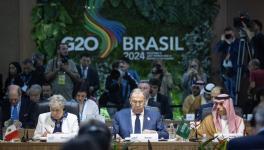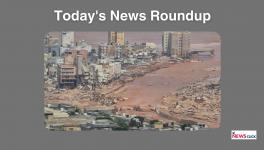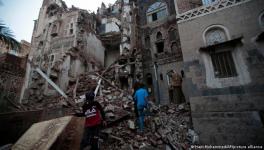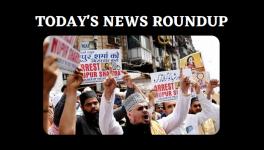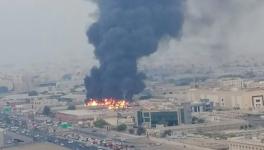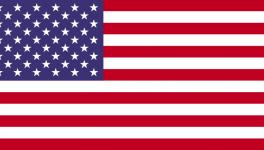Hypocrisy Marks Western Action in Libya
The same day that the Security Council resolution, against Gaddafi, moved by the US, France and Britain was passed, 40 Yemeni protesters (death toll is now 60) were killed by sniper fire of President Saleh’s brutal security forces, bringing the death toll in Yemeni protests to over 80. Just a day before, the Bahraini security forces of King Khalifa, backed by the Gulf Council forces – read Saudi Arabian forces – shot, clubbed and brutally cleared peaceful protesters from the Pearl Square in Manama who were demanding only moderate constitutional reforms. The same day the UN resolution was passed that Gaddafi is to be militarily “tamed” for bombing civilians, the US bombed – using a drone – FATA, in Pakistan, killing 44 civilians, who had gathered there to resolve a local land dispute.
Public memory may be short, but I doubt that people have forgotten that it is the same western powers that protected the Israeli regime when it was bombing the civilian population of Gaza in 2008. Obviously, to the west, Israeli bombs are different from Gaddafi's.
In all this, it is clear that the US and Saudi Arabians have decided to take a hand in the ever growing democratic revolutions in the Arab world. Most of them are to be put down with a heavy hand as they would weaken the US and its allies in the region. In a few cases – and currently Libya is the only one – they are on the side of the protesters, but this has very little to do with democracy. It has everything to do with the strategic balance in the region, particularly control over oil.
The US has always believed that US oil is unfortunately under Arab (and Persian) control and this has been at the heart of US policies in the region. In a situation eerily similar to the current Libyan one, Kennan (George Kennan, the originator of the Truman Doctrine) told Dean Acheson during the US military intervention in Iran in 1953 that he was not too bothered about the rest of Iran as long as the oil fields were under US control. The issue in Libya is not too different.
Not that this makes Gadhafi a figure to be admired. Gadhafi has run Libya as his and his family’s personal fiefdom for the last 40 years. Undoubtedly, he started with a Nasserite agenda but this was given up long back. He still maintained an anti-imperialist rhetoric for some time and the bombing of his residence in 1986 by the US bolstered this image. The reality is that Gadhafi had made his peace with imperialism long back, what remains today is only the rhetoric. After 2003, he has been happy to climb on to the US “War on Terror” and even during the current phase of the civil war is telling the west that he remains a local bulwark against Al Qaeda and therefore they should not support the rebels.
The problem in all this is that the West has never been too bothered by Islamic radicalism, notwithstanding their rhetoric against it. This rhetoric is largely for domestic consumption. The US remains wholly committed to the fundamentalist Saudi monarchy and sees it as a lynch-pin for its strategic dominance over the region. The other lynch-pins are Israel and earlier Egypt and Turkey. That the Saudi monarchy is the most regressive and fundamentalist regime in the world and acts as a banker to Islamic radical groups has not dampened the US enthusiasm for the house of Saud. Therefore, in the larger strategic game of dominating the Arab world – read the oil-world – Islamic radicalism can be an ally as well as a foe. If it is Iran, it is a foe. If it is Gadhafi, it can very well be an ally.
The aim in Libya seems to be the immediate one of protecting the Benghazi rebel base and the oil in the eastern part of Libya. In the Security Council, the western powers have got a blanket enabling provision of not only a no-fly zone to be imposed over Libya but also military action. Already French, US and British forces have attacked Libyan ground forces making clear that the war in Libya has broader aims than just a no-fly zone. It is also clear that British and French special operations groups were already in Libya preparing the ground for a larger war. The question is -- is this war for a regime change a la Saddam and Iraq or only an attempt to create an autonomous protectorate in the eastern part under western protection?
As it stands now, the immediate objective is to create an equivalent of a Kurdistan, centred around Benghazi, which will be a western protectorate. This will ensure that a major portion of the Libyan oil comes under US control weakening Gaddafi further. At some time in the future, they could play a topple-Gaddafi game and try and capture Libya. They would then have the consolation that having “lost” Tunisia and Egypt to democracy, they have at least captured Libya – the recent democratic upsurge can even help them in certain countries. The attempt would be to turn the democratic upsurge towards the enemies of the US in the region – Iran and Syria being the foremost.
The problem for this policy is that all the other countries on the boil right now are US allies. Yemen, Oman, Bahrain and even Saudi Arabia are all facing protests. It is here that the Saudi monarchy is moving to try and crush all democratic movements. Simultaneously, they are offering large amounts of cash to Saudi people, hoping to dampen down local protests.
The Gulf Council was also instrumental in the UN vote on Libya. They were the ones to push this line in the Arab League, which was why finally countries that opposed this move initially abstained and did not oppose the resolution. This is in spite of their misgivings about the way the resolution was drafted and its ambiguities. Interestingly, Lebanon, which has a pro-Hezbollah Government also supported the resolution. This again brings home the point that the Benghazi group may very well have Islamic radicals in it, but this does not really bother the US and its allies.
For Russia, China, India and Brazil, the countries that have publicly stated that the resolution was vague, seemed to have agreed to it because of a fear of a massacre in Benghazi, if it fell to Gadhafi. However by not insisting on clear guidelines and limits to the UN resolution, they have handed over Libya on a platter to the western powers. As the resolution now stands, it pretty much gives a carte blanch to the western powers including future occupation of Libya.
The Yemeni protests have been going on for some time. The use of live ammunition with the intent to kill, may solidify the Yemeni protests. There is news that mountain tribes, the southern part of which had rebelled against the Sanaa Government earlier and the democratic protests could all come together. This might lead again to a civil war in Yemen. This does not auger well for the Yemeni people, where an obdurate Saleh is still clinging on to power with the backing of the Saudis and the US. Of course, there is no talk of protecting civilians in Yemen.
Bahrain, though a small country, is critical to the US strategic interests. It is the headquarters of the 5th Fleet and the obvious spear-point against Iran. The problem for the US and the Saudi regime that by inducting Saudi troops in Bahrain, they have converted the struggle for democracy into a Shia Sunni conflict. This is similar to what the US did in Iraq. Initially, it fanned the fires of a sectarian divide to isolate the Saddam supporters, dubbing them as essentially Sunni. The problem here is that by converting a battle for democracy into an intervention in favour of a fellow Sunni regime and against Bahrain’s majority who are Shias, they are pushing Arab Shias towards Iran. Iran does not have to do anything – the crushing of the majority in Bahrain, in other Gulf states and in Eastern Saudi Arabia, would automatically increase Iran’s influence.
This is not very different from what the US did in Iraq. After defeating Saddam, their policy of supporting Shias meant the automatic increase of Iran’s influence in Iraq. It is ironic that the US recently needed Iran’s help – its strategic enemy in the region -- to cobble together a workable Shia coalition to run Iraq. The final round of discussions between the Shia parties were actually held in Tehran before announcing the final coalition agreement.
The hypocrisy of the western intervention in Libya for “protecting” civilian population is clear. Such protection for the people is not available if the perpetrators are Gulf monarchies or Israel. Whether this will mean and easy end to Gaddafi or whether the west is now going to be involved in another land war in the region remains to be seen. As Iraq has shown, winning the war is easy; it is the occupation that is the problem. Libya will be no different.
(Photo vfrom Flickr via BQR Network)
Get the latest reports & analysis with people's perspective on Protests, movements & deep analytical videos, discussions of the current affairs in your Telegram app. Subscribe to NewsClick's Telegram channel & get Real-Time updates on stories, as they get published on our website.










